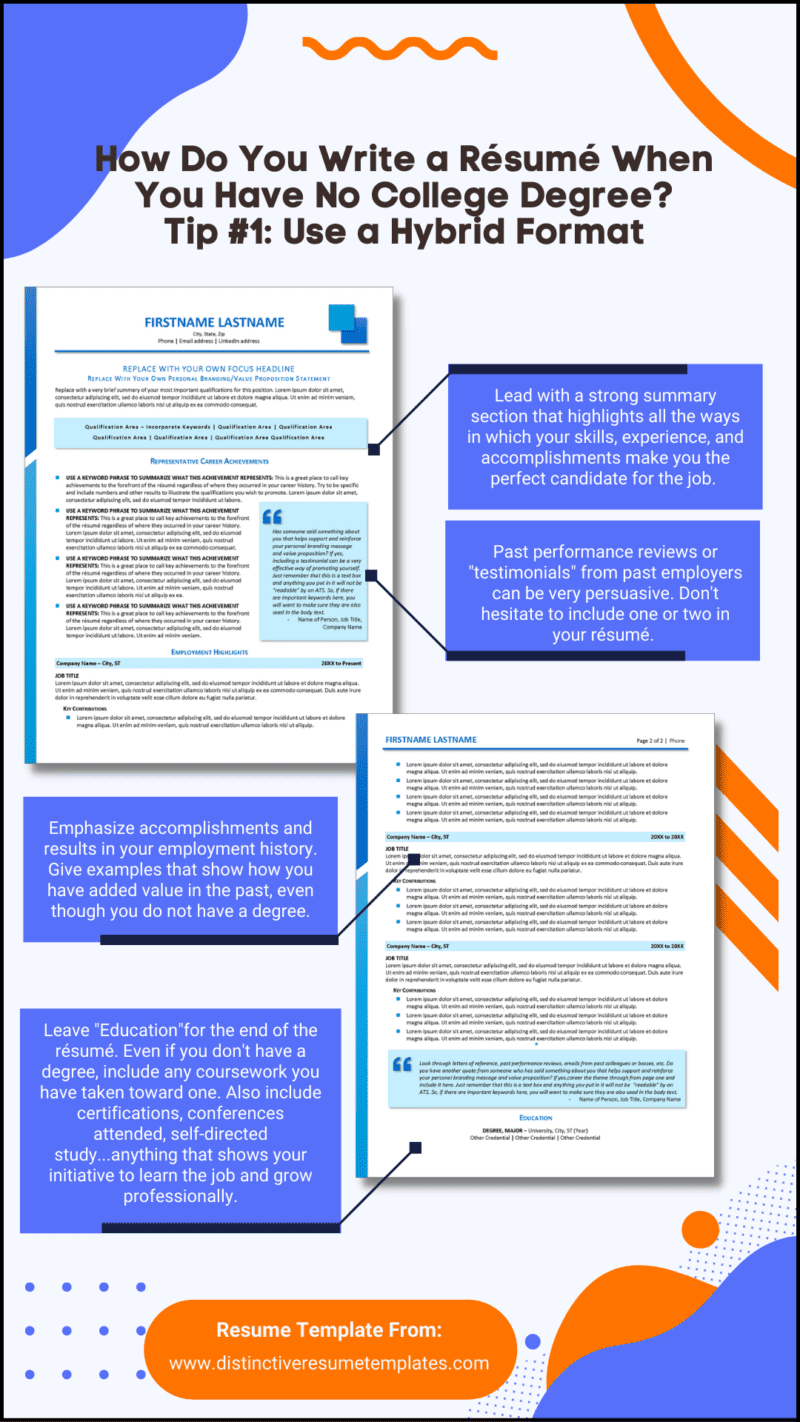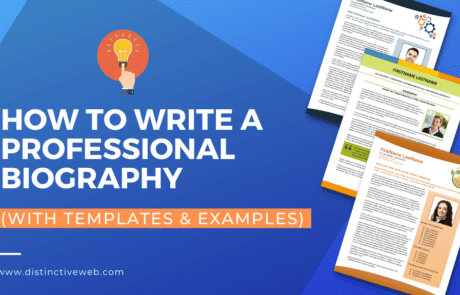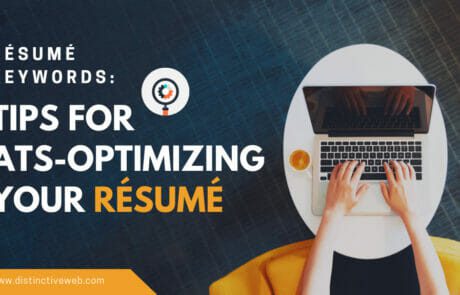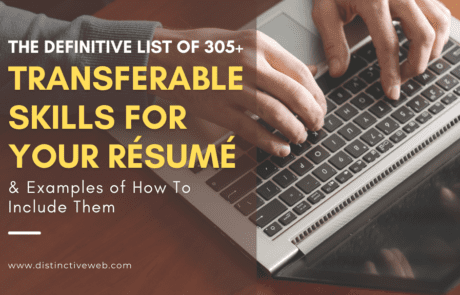
If you are an experienced professional worrying that you don’t have a college degree to include on your resume, you aren’t alone. Questions about how our resume writing team would approach writing a resume with no degree are some of the more common inquiries I have received in all my years as a professional resume writer.
In the second decade of the 21st century, increasing numbers of employers began including a degree requirement as a minimum qualification for open jobs. Mind you, these were jobs that previously had no educational requirements attached to them. Considering that some two-thirds of Americans do not have a college degree, this became an increasingly difficult barrier for the majority of workers, and among our clients, an increasing issue for them to deal with on their resumes. But good company or not, if you are one of these people missing out on job opportunities that you are otherwise qualified for simply because you didn’t complete a degree, knowing that you are one of many is likely little comfort.
But happily, this trend is now reversing, according to a recent Harvard Business Review report of an analysis conducted in partnership with Emsi Burning Glass, a labor market data company. After analyzing 51 million job postings published between 2017 and 2020, researchers found that degree requirements had been lowered for 46% of middle-skill occupations and 31% of high-skill occupations. While there is still much room for improvement, and some of the reset can be attributed to the COVID-19 pandemic and subsequent “Great Resignation,” these findings show that approximately 1.4 million new jobs could open up to those without degrees over the next few years.
Still, that middle ground between jobs that undeniably require higher education (e.g., physician) and those that do not (e.g., restaurant server) is immense. Many of these employers still have degree requirements in place. If you do not have a degree and wish to compete for these jobs, what is the best way to handle education on your resume? The answer is: “it depends.” The best approach will be very individual to your circumstances. But, here are some time-tested strategies and suggestions for you.
Carefully Review the Job Announcement for Both Required and Desired Qualifications
Job announcements are often very specific and state both the required and desired qualifications for the “perfect” candidate. Go through the announcement with a highlighter, carefully noting every qualification mentioned. Especially if you are missing one of these qualifications—a degree—your task will be to show exactly how you are a match for every other requirement.
The closer you are to matching the requirements, the greater your odds of successfully competing for the job. However, keep in mind that some gaps will be too wide to cross. For example, if you are not just missing a required degree but are also missing 50% of the other stated requirements.
But if you are a match for all or most of the qualification requirements, except for the degree, and you can provide concrete examples of how you have still used your skills to add value to your employer, your odds increase exponentially.
Create a Hybrid / Combination Format Resume
Think of your resume structure as a pyramid. The most impressive and relevant information should be at the beginning (top of the pyramid) of the resume. The less impressive and less relevant information should be at the end (bottom of the pyramid).
A combination format resume will usually lead with a really strong professional summary. This will give you the space to call out all of the skills and experiences that match the other requirements of the job. And you will do so right at the forefront of your resume.
With this type of modern resume layout, your will list your education at the end of the resume. This provides you with the format to make a persuasive case for why you are perfect for the job before the employer notices that you don’t quite meet the desired educational requirements.
This example resume template structured in a hybrid format shows how to create this type of resume.
How To Include Education in Your Resume When You Don’t Have a Degree
It is important to remember that almost all employers and recruiters use applicant tracking systems (ATS) to store resumes and track candidates through the hiring process. Hiring managers can input certain criteria and specifications to filter and rank resumes and narrow applicants to a manageable list.
The problem is that education is often one of the filters used to narrow candidates. In some cases, if a degree you don’t have is required, you may have no choice but to accept that you will not get your resume through these filters. If you wish to pursue the job, you will need to find other channels, and this is where brushing up on your networking skills will be helpful.
Considerations related to ATS are also why just dropping the Education section from your resume is not recommended except in the most extreme situations (and be prepared to network heavily if you do). Whenever possible, you should always have a major section labeled “Education” on your resume. Review the following situations to decide what to include in the Education section of your resume.

Situation 1: You worked toward a degree but didn’t complete it
Despite the challenges an ATS presents, if you are applying for a job without a degree, yet you worked toward a degree that you didn’t finish, you should state this in your resume. This provides you the possible opportunity to include the requisite keywords that may get you included in the ATS shortlist of applicants. Here are some possibilities for how you would phrase this on your resume:
Coursework toward Bachelor of Science (B.S.), Biology
NAME OF UNIVERSITY, City, State
Of course, the above could imply two courses toward the degree before you dropped out or three years of coursework. If you feel the need to include context, you have a few options:
Coursework (XX credits) toward Bachelor of Science (B.S.), Biology
NAME OF UNIVERSITY, City, State
Coursework (X semesters) toward Bachelor of Science (B.S.), Biology
NAME OF UNIVERSITY, City, State
Coursework toward Bachelor of Science (B.S.), Biology
NAME OF UNIVERSITY, City, State (20XX to 20XX)
Situation 2: You are enrolled in a degree program now
If you are currently enrolled in and working on a degree program, include it. Again, as shown above, include the degree name as this increases your chances of getting through the ATS cut.
Bachelor of Science (B.S.), Biology in progress, degree expected 20XX
NAME OF UNIVERSITY, City, State
Situation 3: You completed professional coursework but not toward a degree
If you have completed professional training or courses, even if not toward a degree, include it in the education in the same format as if it were a degree. For example, you could include a list like this:
- NAME OF COURSE/TRAINING, Name of organization that provided the training (20XX)
- NAME OF COURSE/TRAINING, Name of organization that provided the training (20XX)
- NAME OF COURSE/TRAINING, Name of organization that provided the training (20XX)
If the courses you completed were more significant or comprehensive, or especially important in your field, you might wish to give the listing more prominence, like this:
NAME OF TRAINING PROGRAM (20XX)
Organization that provided the program
If you are using this strategy, think beyond traditional job-related training or college courses. There are many self-directed online and correspondence courses. If you have completed any relevant ones, you may include these in this section too.
Also, make sure to include any professional certifications you have earned under the education section.
Situation 4: Everything else
Suppose you cannot show work toward a degree, coursework or job-related training, or certifications. In that case, your goal should be to include items in the Education section of your resume that show your commitment to professional development even without more traditional education.
Ideas for this include conferences you have attended, presentations you have delivered, or completed apprenticeships. I even remember one client who had personally read and studied dozens of respected books on her field of interest and regularly read relevant trade magazines and other periodicals. We included a comprehensive list which was quite impressive. As a bonus, the titles of these books included many important resume keywords and phrases that helped her in ATS searches.
Final Considerations
Never forget that it isn’t the job that requires the degree you are missing. It is the employer. Do not ever be tempted to be deceptive on your resume and include a degree you don’t have. It is unnecessary. As shown in this post, you have many opportunities to write a resume even without a degree that shows how you are qualified and can add value. Experiment with the format of how you include this in your resume and you will find the right formula.
Employers are interested in how you can make them money, save them money, improve efficiency, or solve their problems. Show them that you can do this in a more profitable way than your competitor for the job (who happens to have a degree but not the great experience you have), and you will be irresistible.
Frequently Asked Questions
What is the best way to write a resume if I don't have a degree?
If you don’t have a degree, you can still write a strong resume by focusing on your skills, experiences, and other qualifications. Start with a professional summary that highlights your strengths, and list your education at the end of the resume. If you’ve taken any professional courses or training, include those as well.
How can I make my resume stand out without a degree?
To make your resume stand out without a degree, focus on showcasing your skills and experiences that match the job requirements. Use a combination format resume that starts with a strong professional summary. Include any professional training or courses you’ve completed, and highlight your commitment to professional development.
Can I still get a good job without a degree?
Yes, you can still get a good job without a degree. Many employers are more interested in your skills and experiences than formal education. Show how you can add value to the company, such as by improving efficiency or solving problems.
What should I put in the education section of my resume if I don't have a degree?
If you don’t have a degree, you can still include an education section in your resume. List any coursework you’ve completed, even if it wasn’t part of a degree program. Include any professional training or certifications you’ve earned. You can also list conferences you’ve attended, presentations you’ve delivered, or books you’ve studied related to your field.
Is it okay to leave the education section off my resume if I don't have a degree?
It’s generally recommended to include an education section on your resume, even if you don’t have a degree. This section can include professional training, certifications, or other forms of professional development. Leaving it off entirely could cause your resume to be filtered out by applicant tracking systems.
Can I include a degree I'm currently working on in my resume?
Yes, if you’re currently enrolled in a degree program, you should include it in your resume. List the degree you’re working towards and the expected completion date.
Is it okay to list a degree I started but didn't finish on my resume?
Yes, if you started a degree but didn’t finish, you can still list the coursework you completed on your resume. This can help you get past applicant tracking systems that filter resumes based on education keywords.









